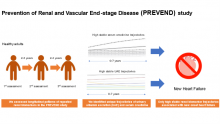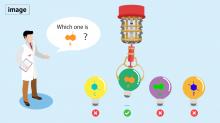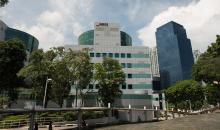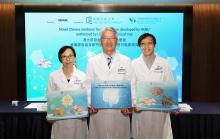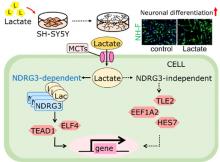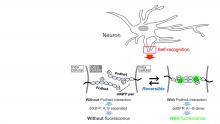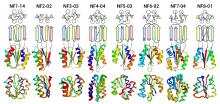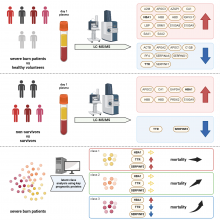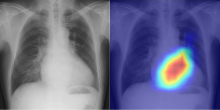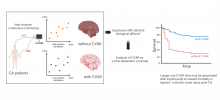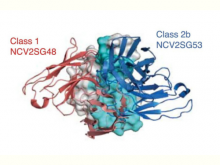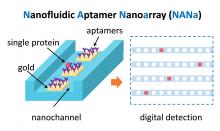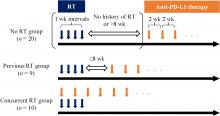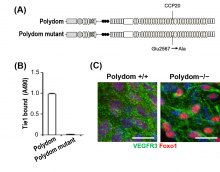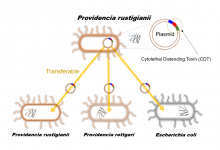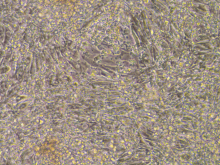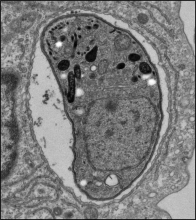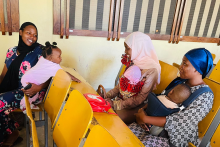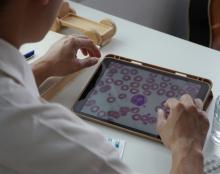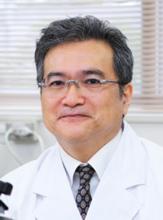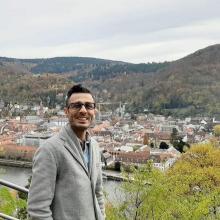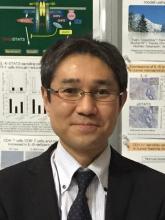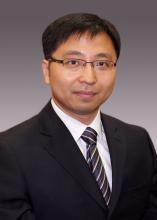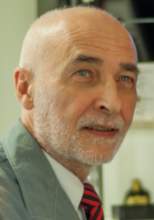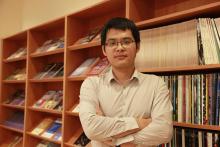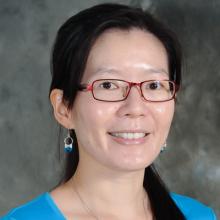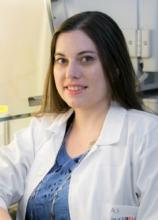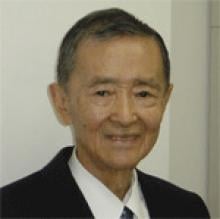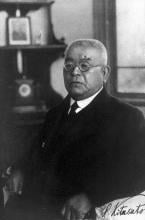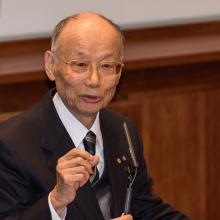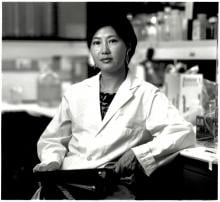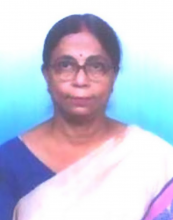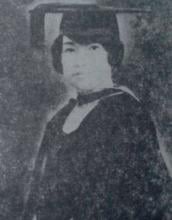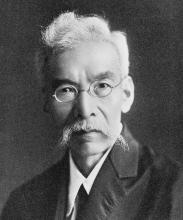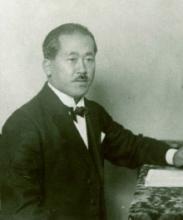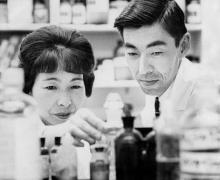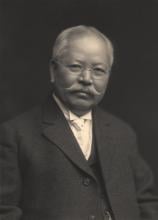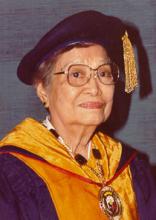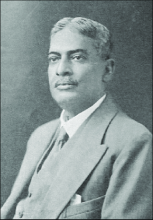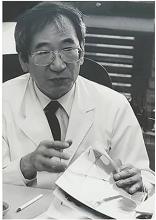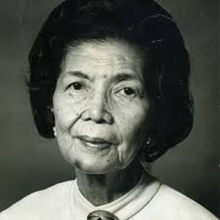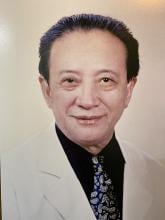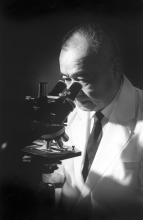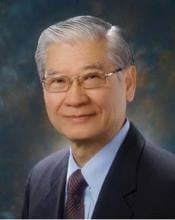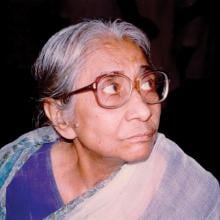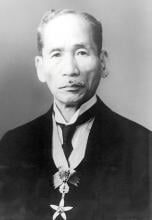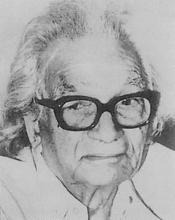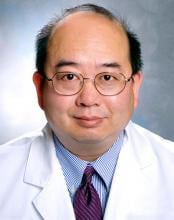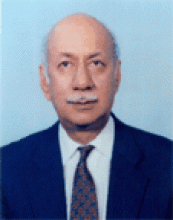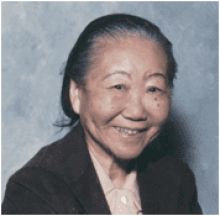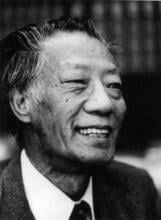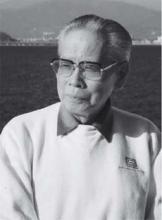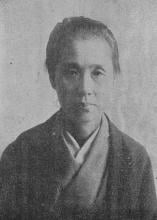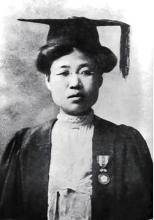Medicine
News
03 Aug 2023
The researchers from Osaka University showed how bone erosion caused by cholesteatoma occurs. This study showed that a subset of cells called osteoclastogenic fibroblasts expresses a protein, activin A, which causes the breakdown of the bones. Because of this discovery, novel medical treatments can be developed as first-line management for cholesteatomas.
01 Aug 2023
Researchers from Osaka University found that patients with persistently high levels of urinary albumin excretion in the long term are at high risk of new-onset heart failure. Preventive treatment associated with the lowering of urinary albumin excretion levels in these patients could reduce the risk of later heart failure or mortality.
31 Jul 2023
Researchers from Osaka University have demonstrated a proof-of-concept for identifying single nucleotides by using quantum computing. Molecular rotation patterns—and the corresponding variations in conductance—within the nanoscale gap between two electrodes enabled the development of a quantum gate for the nucleotide adenosine monophosphate. Developing quantum gates for the other three nucleotides, and incorporating this technology into DNA sequencing workflows, could revolutionize genome analysis.
28 Jul 2023
Scientists have isolated potent neutralising antibodies from a COVID-19 vaccinated SARS survivor that exhibited remarkable breadth against known sarbecoviruses. The antibodies targeted a conserved region of the spike protein and blocked receptor binding and viral fusion. These findings could guide the development of broadly active therapeutics against current and future coronaviruses.
26 Jul 2023
The consortium’s multidisciplinary executive committee comprises of both local and international oral health researchers.
25 Jul 2023
The Centre for Chinese Herbal Medicine Drug Development (CDD) of Hong Kong Baptist University (HKBU) has made significant progress in developing novel Chinese medicine for treating chronic constipation. With its success in the Investigational New Drug Application to the U.S. Food and Drug Administration (FDA), CDD has been authorised to conduct a phase I clinical trial of the new drug. This is the first time that a new botanical drug developed in Hong Kong was authorised to conduct a clinical trial in the US.
24 Jul 2023
Lactate is a byproduct of exercise and metabolism, fueling our brain when oxygen is limited. More recently, scientists have become aware of the many roles it plays in developing our nervous system. Now, researchers from Tohoku University have unearthed the cellular mechanisms by which lactate helps our brains develop.
19 Jul 2023
Scientists have combined two light wavelengths to deactivate a bacterium that is invulnerable to some of the world’s most widely used antibiotics, giving hope that the regime could be adapted as a potential disinfectant treatment.
18 Jul 2023
RNases have been proposed as a treatment against systemic autoimmune diseases. Researchers from Osaka University showed that RNases have a dual action. In some cases, RNases are detrimental and stimulate the immune response by promoting the binding of antibodies to their targets. These findings will improve the understanding and treatment of systemic autoimmune disorders.
14 Jul 2023
Researchers from Osaka University have developed a fluorescent sensor that may be useful for understanding how cells recognize themselves versus other cells when making connections in the brain. Specifically, their sensor can be used to visualize not only connections between cells, but also the disassociation of these interactions. Because neuronal self-connectivity has been implicated in brain disorders like epilepsy and autism, a better understanding of this process may result in improved therapies.
11 Jul 2023
A research team has discovered an astounding array of unexplored protein folds. This research will expand our understanding of the depth of the protein universe and the possibilities for de novo design of functional proteins.
11 Jul 2023
The physiological mechanisms underlying severe burns are not well understood. Researchers at Osaka University used mass spectrometry to identify key blood proteins associated with burn mortality. Ultimately, three proteins (HBA1, TTR, SERPINF2) were very highly correlated with morality rates. Further research into these proteins and their pathways may lead to better drugs to treat people with life-threatening burns.
11 Jul 2023
The entire biosynthetic pathway of actinopyridazone has been unveiled, revealing that an unprecedented carrier protein-mediated ring-forming step is key to its synthesis.
07 Jul 2023
Asia Research News monitors the latest research news in Asia. Some highlights that caught our attention this week are a way to avoid biopsies by catching free-floating DNA, a large dip in the Earth’s surface under the Indian Ocean, and how people who brush their teeth before bed seem to have healthier hearts.
06 Jul 2023
Osaka Metropolitan University scientists have successfully developed a model that utilizes AI to accurately classify cardiac functions and valvular heart diseases from chest radiographs. The Area Under the Curve, or AUC, of the AI classification showed a high level of accuracy, exceeding 0.85 for almost all indicators and reaching 0.92 for detecting left ventricular ejection fraction—an important measure for monitoring cardiac function.
03 Jul 2023
A group of researchers at Osaka University used a noninvasive method to evaluate Cerebrovascular Autoregulation (CVAR) in patients after out-of-hospital cardiac arrest. The mortality rate increased significantly with the duration of time that CVAR was undetectable.
It has been suggested that CVAR, a function that is normally present in the normal state, may be impaired after cardiac resuscitation. However, the relationship between CVAR function and patient prognosis has been unclear. The research examined CVAR over time, using the moving Pearson correlation coefficient calculated from regional cerebral oxygen saturation and mean blood pressure data, and performed a survival analysis using the presence or absence of CVAR as a time-dependent covariate.
The findings of this study may first be useful in predicting neuroprognosis after cardiac resumption and may help avoid early withdrawal of treatment in those who may recover. In addition, they suggest that treatment and management that maintains proper CVAR after cardiac resumption may improve patient prognosis, which may be applied to the management of post-cardiac arrest resuscitation based on cerebral circulation to optimize treatment for each individual patient.
28 Jun 2023
Researchers from Osaka University have revealed the mechanism by which increased signaling through a pathway associated with a molecule called Wnt leads to the development of liver cancer. They identified a gene called GREB1 as a target of Wnt specifically in liver cancer. This gene alters the function of a protein called HNF4α, leading to the development of cancer. They also showed that treatment of mice with antisense oligonucleotides against GREB1 had significant anti-cancer effects.
26 Jun 2023
What scientists learned about the rare antibodies targeting SARS-CoV-2’s Achilles’ heel could help fine-tune our COVID-19 vaccine strategy for longer-lasting immunity.
23 Jun 2023
An international team led by Professor Yan Xu from Osaka Metropolitan University has developed a groundbreaking nanofluidic device, named NANa, capable of stochastically capturing and digitally detecting individual proteins at cellular concentrations. This tool, vital for precision medicine, is designed to handle tiny volumes equivalent to a single cell's contents and can identify single biomolecules even in high-concentration environments. The team plans to conduct further demonstrations using actual cell samples and explore the integration of this tool with AI and biological big data. This research could potentially revolutionize personalized disease prevention and treatment.
23 Jun 2023
A combination of radiotherapy followed by immunotherapy is a promising strategy for the treatment of oral malignant melanomas in dogs.
19 Jun 2023
A key protein for sperm maturation identified, Understanding gel formation, Urine test predicts organ diseases, A laser drills holes in a graphene film. Plus in our blog - The frogs of Borneo: more than just a race. Read all in the latest Editor's Choice.
19 Jun 2023
Researchers from Osaka University found that the binding of two proteins—Polydom and Tie1—is essential for lymphatic cell migration in the remodeling of lymphatic vessels, which transport molecules around the body. A better understanding of the development and remodeling of the lymphatic system will lead to better therapeutic options for diseases such as lymphedema, which is common in cancer patients and currently has no cure.
15 Jun 2023
A joint research group led by Osaka Metropolitan University has clarified how pathogenic genes in some Providencia spp., which have gained attention as causative agents of food poisoning as well as enterohemorrhagic Escherichia coli. O157 and Salmonella, are transferred within bacterial cells. Their findings are expected to provide new insights into the identification of infection routes of Providencia spp. and the establishment of preventive methods for food poisoning.
08 Jun 2023
A stem cell therapy treatment developed by Duke-NUS Medical School researchers for heart failure has shown promising results in preclinical trials. These cells, when transplanted into an injured heart, are able to repair damaged tissue and improve heart function.
05 Jun 2023
Researchers from Osaka University developed an in vivo CRISPR screen to analyze factors affecting Toxoplasma gondii fitness in healthy and immunodeficient mice. Mice were infected with Toxoplasma containing CRISPR libraries that targeted specific genes; genetic sequencing was then performed to identify which genes are important to fitness. The genetic screen clarified the contributions of host genetics and parasite genetics and can contribute to the development of strategies for toxoplasmosis treatment and prevention.
05 Jun 2023
App leads to better birth preparation for pregnant women
01 Jun 2023
Tests could soon identify patients who will respond well to the available treatment for chronic myeloid leukaemia and those who will be resistant to it—which could improve their chances of survival.
29 May 2023
Zinc is essential for our health. Our bodies must constantly regulate its zinc levels, otherwise fatal diseases such as cancers, growth failures, ad immunodeficiency can occur. Now, a research group has unearthed how zinc transporter complexes regulate zinc ion concentrations in different areas of the Golgi apparatus.
25 May 2023
Truck drivers unintentionally taking ‘microsleeps’ of a few seconds can cause terrible traffic accidents, but efforts and technologies aiming to prevent the problem have focused mainly on monitoring driver eye activity while missing a host of other key indicators of the problem.
19 May 2023
Mushrooms 🍄get chattier after rainfall 🌧️, Two-organ chip answers fatty liver questions, History maps 🗺️vs future simulations, Restoring vision in blindness. Plus in our blog: Myanmar: Through eyes of leadership. Read all in the latest Editor's Choice.
Events

10 Jul 2017
This event is organized by Global Pharmacovigilance Conference Series

21 Mar 2017
At BioPharma Asia 2017, hear from 120+ C-Level executives on industry case studies, ensuring you can learn from the best of the best and make new business contacts with 2000+ pharma executives from Asia and beyond.

18 Oct 2017
Medical Nanotechnology 2017 provides a perfect symposium for scientists, engineers, directors of companies and students in the field of Nanotechnology to meet and share their knowledge.

19 Jan 2017
Back for the second time, SingHealth Duke-NUS Research Day will be held on 19 January 2017 at Academia.
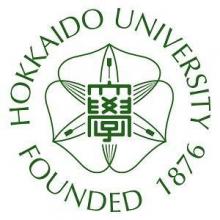
17 Oct 2016
This symposium will highlight research and education for the creation of a healthy society toward the achievement of United Nations Sustainable Development Goals (SDGs).
The lectures and discussions cover the themes including the promotion of safe water environments, hazardous material elimination, and mother-and-child health.

27 Sep 2016
Global leaders in healthcare and medicine will meet in Beijing, China, later this month to tackle a pressing question: How do we promote and maintain good health and well-being for a growing global population?
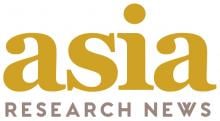
07 Nov 2016
The Frontiers in Cancer Science (FCS) 2016, our 8th annual conference, is jointly organized by the 6 major institutes in Singapore. Converging the latest cancer discoveries around the world, the meeting promises groundbreaking and innovative insights into cancer research.

26 Nov 2016
Breakthrough to Excellence and Develop Worldwide Opportunities! Welcome to APFCB 2016 in Taipei, Taiwan!

13 Oct 2016
Select Bio and the Diagnostics Development Hub, part of Exploit Technologies Pte. Ltd. present Singapore’s Diagnostics Summit 2016

05 Dec 2016
SELECTBIO and the Singapore Institute of Manufacturing Technology (SIMTech), are pleased to present the Fourth Annual Lab-on-a-Chip Asia Conference and Exhibition, taking place at Academia, within the Singapore General Hospital Campus.

29 Sep 2016
“Contemporary Challenges, Sustainable Solutions”

26 Jun 2016
On behalf of the ISEE-ISES AC2016 Sapporo organizing committees, it is great pleasure to welcome you to the 5th ISEE Asia Chapter and the first joint symposium of ISEE and ISES, Asia chapter. The program theme is “Environment, Health, and Sustainable Society” and will be held in Sapporo, Hokkaido, Japan on June 26-29th, 2016.

18 Oct 2016
Malaysia Technical Scientist Association and Universiti Tun Hussein Onn Malaysia will collaborate to organize "2016 International Conference on Herbal Science, Technology & Medicine" to be held in Krabi, Thailand from October 18 -20, 2016.

19 Aug 2016
SELECTBIO is delighted to welcome you to its forthcoming International Conference “Next-Gen Sequencing and Mass Spectrometry” scheduled to be held on 19-20 August, 2016 in Hotel Radisson Blu Plaza, Delhi, India.

21 Jul 2016
Select Biosciences South East Asia are pleased to present Bioprinting and 3D Printing in the Life Sciences, taking place on the 21-22 July 2016 at Academia, the state-of-the-art conference facilities housed within the Singapore General Hospital Campus.

27 May 2016
SELECTBIO is delighted to announce its highly focused International Conference Biofluid Biopsies which is scheduled to be held on May 27, 2016 in Sheraton Grand Bangalore Hotel at Brigade Gateway, Bengaluru, India.

07 Apr 2016
This event which will be held in Taipei, Taiwan, will focus on an exciting area of research: Liquid (biofluid) biopsy development driven by circulating biomarkers such as circulating nucleic acids, circulating extracellular vesicles (such as exosomes) and circulating tumor cells (CTCs).

26 May 2016
SELECTBIO takes great pleasure in inviting you all to attend its Inaugural International Conference “Advanced Diagnostics 2016” scheduled to be held on May 26-27, 2016 at Sheraton Grand Bangalore Hotel at Brigade Gateway, Bengaluru, India.

26 May 2016
SELECTBIO brings to you its International Conference “Biomarkers India 2016” scheduled on May 26-27, 2016 at Sheraton Grand Bangalore Hotel at Brigade Gateway, Bengaluru, India.

28 Feb 2016
Scientists from around the world will meet in Hermanus, near Cape Town, South Africa, from 28 February to 1 March 2016 to discuss how best science can guide sustainable development globally.

22 Mar 2016
The 9th annual Biopharma Asia Convention 2016 brings together C-level attendees from pharmas, biotecs and service providers to learn and discuss market trends and biologic development strategies. With 7 premium conference tracks, the event will cover the entire spectrum of the biopharma value chain.

28 Sep 2016
The 2nd edition of Pharma+Bio Asia 2016 returns to Kuala Lumpur Convention Centre on 28-29 September 2016 as the international conference and exhibition for the Pharmaceutical, Biopharmaceutical, Medical and Healthcare industry.

10 Oct 2016
Theme: Challenges and Innovations in Pharmaceutical Sciences

24 Feb 2016
Select Biosciences South East Asia is pleased to present the Second Annual Clinical Applications of Stem Cells, taking place on the 24-25 February 2016.

02 Sep 2015
Harnessing the Challenges of the Changing Pharmaceutical Landscape
2-4 September 2015, Kuala Lumpur Convention Centre, Kuala Lumpur

25 Sep 2015
Innovations in Cancer Research and Regenerative Medicine

25 May 2015
This international symposium brings together world-class scientists in biology and chemistry, including, Dr. Ashraf Brik (Technion-Israel Institute of Technology, Israel) and Dr. Feng Zhang (Broad Institute of MIT and Harvard, USA).

21 May 2015
Select Biosciences South East Asia is pleased to present Advances in qPCR and dPCR.

26 Feb 2015
The Singapore Bioimaging Consortium and Select Biosciences South East Asia present the Clinical Applications
of Stem Cells. Taking place on the 26-27 February 2015, at Academia, a state-of-the-art conference facility housed in the
campus of Singapore General Hospital, Singapore.

16 Oct 2014
On behalf of the Conference Organizing Committee, we are honored to invite you to the 46th Asia Pacific Academic Consortium for Public Health APACPH Conference, hosted by the Department of Social and Preventive Medicine, Faculty of Medicine, University of Malaya.
Researchers
Tohoku University
A professor at the Bone Regenerative Engineering Laboratory, Regenerative and Biomedical Engineering Division, Graduate School of Biomedical Engineering, Tohoku University, Japan
Institute for Integrated Cell-Material Sciences (iCeMS) at Kyoto University
My research background covers multidisciplinary fields such as Pharmaceutics, Cancer Nanomedicine, Bioengineering and Organ-on-a-chip platforms. My current research focuses on the development of dynamic biological barriers on a chip such as blinking human cornea on a chip.
Hokkaido University
Hidemitsu Kitamura is an associate professor at the Section of Disease Control, the Institute for Genetic Medicine, Hokkaido University, Japan.
The Chinese University of Hong Kong (CUHK)
Li Zhang is an Associate Professor in the Department of Mechanical and Automation Engineering (MAE) and an associate faculty member in Chow Yuk Ho Technology Centre for Innovative Medicine (TIM) and T Stone Robotics Institute (CURI) at The Chinese University of Hong Kong (CUHK). He is also the co-director of CAS SIAT-CUHK Joint Laboratory of Robotics and Intelligent Systems.
Professor Samuel Wong is a clinician with training in both Family Medicine and Public Health. He received his Doctor of Medicine degree from the University of Toronto and completed his Family Medicine residency training in Canada. He completed the Master of Public Health at the Johns Hopkins University, USA and the Doctor of Medicine (MD) research degree at The Chinese University of Hong Kong.
He is the Head of the Division of Family Medicine and Primary Healthcare and the Deputy Director of the School of Public Health and Primary Care since 2019. He has been the Co-Director of the Master of Public Health Programme since 2018 and is the Director of Thomas Jing Centre for Mindfulness Research and Training. He has also been appointed as the Associate Dean (Education) of the Faculty of Medicine since July 2019.
Professor Wong’s research interests include evaluating and developing mindfulness- based and mental health interventions in primary care; evaluating primary care services and developing primary care service models as well as multimorbidity.
Tohoku University
Viteroretinal surgeon working on developing treatments for retinal dystrophies and many other retinal diseases.
Hong Kong Baptist University (HKBU)
Dr. Simon Quan-Bin Han is an Assistant Professor at the School of Chinese Medicine, Hong Kong Baptist University.
Kanazawa University
Dept of Medical Neuroscience, School of Medicine, Kanazawa University
Korea Advanced Institute of Science and Technology (KAIST)
Professor in Electrical Engineering at Korea Advanced Institute of Science and Technology (KAIST).
Prof. Dr. Francisco J. Barrantes is the Head of the Laboratory of Molecular Neurobiology, BIOMED UCA-CONICET, Buenos
Aires, Argentina.
Kyoto University
Masanori Shimono is an associate professor at Kyoto University Graduate School of Medicine.
The Hong Kong University of Science and Technology (HKUST)
Jiguang Wang is an Assistant Professor in Division of Life Science (LIFS) and Department of Chemical and Biological Engineering (CBE), Hong Kong University of Science and Technology (HKUST).
Universiti Malaysia Sarawak
Dr Kuan is currently a Professor and Consultant Haematologist at the Department of Medicine, Faculty of Medicine and Health Sciences, Universiti Malaysia Sarawak .
Tohoku University
Professor Tetsuya Kodama is a biomedical engineer at the Laboratory of Biomedical Engineering for Cancer, Graduate School of Biomedical Engineering, Tohoku University.
Aamir Jalal Al Mosawi is advisor in pediatrics and pediatric psychiatry at the Children Teaching Hospital of Baghdad Medical City.
Hokkaido University
Toru Kondo is Professor of the Division of Stem Cell Biology at the Institute for Genetic Medicine, Hokkaido University.
Professor and Head of Microbiology and Immunology Department,
Faculty of Medicine, Lincoln University College (LUC) Malaysia.
Duke-NUS Medical School
Prof. Ashley St. John is an expert in viral immunology and emerging infectious diseases, such as dengue and Zika viruses. She heads the Laboratory of Immunity and Immune Pathology at Duke-NUS Medical School.
- « first
- ‹ previous
- 1
- 2
- 3
- 4
Giants in history
Michiaki Takahashi (17 February 1928 – 16 December 2013) was a Japanese virologist who developed the first chickenpox vaccine.
Irene Ayako Uchida’s (8 April 1917 – 30 July 2013) strides to understand genetic diseases such as Down syndrome paved the way for early screening of chromosomal abnormalities in foetuses.
Baron Kitasato Shibasaburo (29 January 1856 – 13 June 1931) was a Japanese physician and bacteriologist whose work led to a new understanding of preventing and treating tetanus, diphtheria and anthrax.
Maggie Lim (5 January 1913 – November 1995) was a Singaporean physician who promoted family planning and expanded the access to clinics to improve the quality of life for mothers and children in Singapore’s early days.
By isolating soil microorganisms and studying the compounds they produce, Satoshi Omura (born 1935) discovered almost 500 organic compounds with unique properties that were produced by these microorganisms, including many new antibiotics.
The founder of the Adyar Cancer Institute in India, Muthulakshmi Reddy (30 July 1886 – 22 July 1968), fought to uplift women and girls from impoverished situations.
Chinese-American virologist and molecular biologist Flossie Wong-Staal (27 August 1946 – 8 July 2020) was the first scientist to clone HIV and determine the function of its genes.
Maharani Chakravorty (1937 – 2015) was one of India’s earliest molecular biologists whose research paved the way for advances in the treatment of bacterial and viral infections.
Archana Sharma (16 February 1932 - 14 January 2008) conducted research into plant and human genetics that expanded the understanding of both botany and human health. In relation to botany, she uncovered the means by which asexually-reproducing plants evolve into new species.
The first Thai woman to receive a degree in medicine, Margaret Lin Xavier (29 May 1898 – 6 December 1932), is best remembered for her compassion towards her less privileged patients.
In 1915, pathologist Katsusaburo Yamagiwa and his research assistant Koichi Ichikawa became the first to prove that chronic exposure to chemicals can cause cancer.
In 1915, Koichi Ichikawa along with pathologist Katsusaburo Yamagiwa became the first to prove that chronic exposure to chemicals can cause cancer.
Husband and wife team, Kimishige (3 December 1925 – 6 July 2018) and Teruko Ishizaka (28 September 1926 – 4 June 2019) discovered the antibody class Immunoglobulin E (IgE) that triggers allergic reactions. They also discovered that IgE antibodies attach to white blood cells, known as mast cells, releasing histamine, which causes allergic reactions.
Husband and wife team, Kimishige (3 December 1925 – 6 July 2018) and Teruko Ishizaka (28 September 1926 – 4 June 2019) discovered the antibody class Immunoglobulin E (IgE) that triggers allergic reactions. They also discovered that IgE antibodies attach to white blood cells, known as mast cells, releasing histamine, which causes allergic reactions.
Japanese chemist Takamine Jokichi (3 November 1854 – 22 July 1922) founded the Tokyo Artificial Fertilizer Company, where he isolated a starch-digesting enzyme (named takadiastase) from the fungus Aspergillus oryzae.
Ground-breaking cancer researcher Kamal Jayasing Ranadive (8 November 1917 – 11 April 2001) advanced the understanding of the causes of leukaemia, breast cancer and oesophageal cancer through the use of animal models. She was also among the first to recognise how susceptibility to cancer is linked to tumour-causing interactions between hormones and viruses.
The research of Filipino pharmaceutical chemist Luz Oliveros-Belardo (3 November 1906 – 12 December 1999) focussed on essential oils and other chemicals derived from native Philippine plants.
Thai physician and conservationist Boonsong Lekagul (1907 – 1992) made major contributions to the preservation of his country’s wildlife.
Indian scientist and physician Upendranath Brahmachari (19 December 1873–6 February 1946) is best known for creating a drug called Urea Stibamine, used to safely and reliably treat visceral leishmaniasis (or Kala-azar), a severe infection caused by the Leishmania parasite.
Filipino chemist and pharmacist Manuel A. Zamora (29 March 1870 – 9 July 1929) is best remembered for his discovery of the tiki-tiki formula to combat beriberi, a disease caused by Vitamin B1 deficiency.
Korean parasitologist Seung-Yull Cho (16 November 1943 – 27 January 2019) is remembered largely for his pioneering works to control infections caused by helminthic parasites and his contribution to journal publishing.
Fe Villanueva del Mundo (27 November 1911 – 6 August 2011) was a Filipina paediatrician who founded the Philippines’ first paediatric hospital.
After witnessing death and suffering as a youth in his home village during World War II, Nguyễn Tài Thu (6 April 1931 – 14 February 2021) set his sights on alleviating pain by becoming a doctor. After studying Traditional Chinese Medicine in China in the 1950s, Thu returned to Vietnam to serve in military hospitals. Eventually, he became the country’s foremost practitioner of acupuncture, a technique he first learned by inserting needles into himself.
Minoru Shirota (April 23, 1899 – March 10, 1982) was a Japanese microbiologist who invented the popular fermented drink Yakult.
Wu Lien-teh (10 March 1879 – 21 January 1960) was a Malaysian-born doctor who invented a mask that effectively suppressed disease transmission. Winning the prestigious Queen’s Scholarship enabled Wu to become the first Chinese student to study medicine at the University of Cambridge.
David T. Wong (born 1936) is a Hong Kong-born American neuroscientist who is best known for discovering the antidepressant drug fluoxetine, better known as Prozac.
Indian organic chemist Asima Chatterjee (1917 to 2006) studied the medicinal properties of plant products, especially compounds known as vinca alkaloids.
Chika Kuroda (24 March 1884 – 8 November 1968) was a Japanese chemist whose research focussed on the structures of natural pigments.
Umetaro Suzuki (7 April 1874 – 20 September 1943) was a Japanese scientist best remembered for his research on beriberi, a disease caused by vitamin B1 deficiency, characterized by limb stiffness, paralysis and pain.
Salimuzzaman Siddiqui (19 October 1897 – 14 April 1994) was an artist and chemist from Pakistan whose research focused on natural products from plants.
Barry Paw (29 August 1962 – 28 December 2017) was a biologist and oncologist who discovered several novel genes and their functions in red blood cells.
Syed Qasim Mehdi (13 February 1941 – 28 September 2016) was a Pakistani molecular biologist who was a founding member of the Human Genome Diversity Project (HGDP), which assessed human diversity by studying human migration, mutation rates, relationships between different populations, genes involved in height and selective pressure.
Tsai-Fan Yu (1911 – 2 March 2007) was a Chinese-American physician and researcher who was the first female full professor at Mount Sinai School of Medicine. She discovered that gout, a condition characterized by the painful inflammation of joints, was caused by elevated levels of uric acid in the bloodstream.
Min Chueh Chang (10 October 1908 – 5 June 1991) was a Chinese-American biologist who studied fertilization in mammalian reproduction.
A Japanese surgeon, Tetsuzo Akutsu (20 August 1922 – 9 August 2007) built the first artificial heart capable of keeping an animal alive.
Ogino Ginko (3 March 1851 – 23 June 1913) was the first registered female doctor to practise modern medicine in Japan.
Esther Park (1877-1910), born Kim Jeom-dong, was the first female Korean physician to practise modern medicine in Korea and trained the first generation of Korean female doctors.



